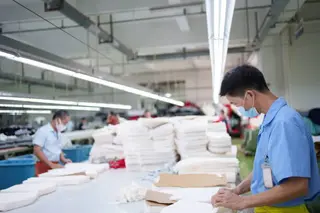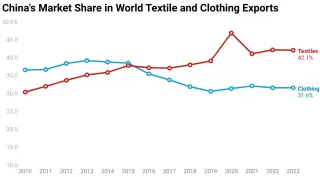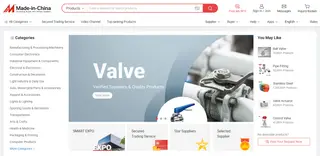How to Find Clothing Manufacturers in China
On this page
Introduction
In today’s global marketplace, finding the right clothing manufacturer is crucial for businesses aiming to create high-quality apparel at competitive prices. With a wealth of resources and expertise, China has established itself as a powerhouse in textile and garment production. This article explores why sourcing from China is advantageous, the locations of manufacturers, and practical steps to connect with the right suppliers.
Why Sourcing from China is the Smartest Choice?
1. Diverse Network of Suppliers
One of the primary reasons to source clothing from China is the country’s extensive network of suppliers. With approximately 44,000 companies involved in textile and apparel manufacturing, businesses have access to a wide variety of manufacturers that cater to different styles, materials, and price points. Whether you're looking for luxury garments or fast fashion, you're likely to find a suitable supplier in China that meets your specific needs.
2. Cost-Effective Labor Options
China’s labor costs remain relatively low compared to Western countries, which allows manufacturers to offer competitive pricing on their products. This cost-effectiveness is a significant advantage for businesses looking to maximize profit margins without compromising on quality. Furthermore, many Chinese manufacturers have adopted advanced production techniques that enhance efficiency and reduce waste, ultimately contributing to lower overall costs.3. Superior Product Quality
Chinese manufacturers have made substantial investments in technology and training to improve product quality. Many factories adhere to international quality standards and are certified by organizations like ISO, ensuring that the products meet or exceed customer expectations. The emphasis on quality control means that businesses can confidently source apparel from China, knowing they are receiving high-quality products.4. Enhanced Scalability
Sourcing from China allows businesses to scale their operations quickly and effectively. Manufacturers in China can accommodate large orders and offer flexibility to adjust production levels based on market demand. This scalability is particularly beneficial for businesses experiencing rapid growth or those that wish to test new product lines without significant financial risk.5. Direct Sourcing Advantages
By sourcing directly from manufacturers, businesses can build strong relationships and negotiate better terms, such as pricing, payment conditions, and lead times. Direct sourcing eliminates intermediaries, allowing for more transparent communication and faster response times. This direct line to manufacturers can lead to enhanced collaboration, resulting in improved product development and innovation.Where Are Clothing Manufacturers Located in China?
China's garment manufacturing landscape is diverse, with a concentration of factories in key provinces. The country is home to around 21,000 companies specializing in textile manufacturing. While it’s impractical to list every manufacturer, understanding the geographical distribution can help businesses target their sourcing efforts effectively.Key Manufacturing Regions:
Shandong
Known for its textile production, Shandong boasts numerous factories specializing in cotton and synthetic fabrics.
Jiangsu
This province is a hub for high-quality garment manufacturing, particularly in silk and women's fashion.
Zhejiang
Renowned for its knitwear and casual clothing, Zhejiang has many manufacturers focusing on trendy designs.
Fujian
Home to several footwear and apparel companies, Fujian is known for producing sportswear and casual clothing.
Guangdong
This province is a significant player in the apparel industry, known for its comprehensive supply chains and export capabilities.
By leveraging these online B2B marketplaces, businesses can simplify the process of finding and vetting clothing manufacturers in China. These platforms not only offer access to a wide range of suppliers but also empower businesses with tools and resources to make informed sourcing decisions. With the right approach, sourcing clothing from China can be a highly efficient and beneficial strategy for businesses looking to enhance their product offerings.
How to Find a Clothing Manufacturer in China?
Finding the right clothing manufacturer in China can seem daunting, but several strategies can simplify the process:Leverage Third-Party Agencies to Connect with Chinese Clothing Suppliers
Engaging a sourcing agent or third-party agency can save time and reduce the risk of dealing with unfamiliar suppliers. These agencies typically have established networks and can help identify manufacturers that align with your specific needs. They can also assist in negotiating contracts, managing quality control, and facilitating communication.Discover Chinese Clothing Manufacturers Through Online B2B Marketplaces
In today's digital age, online B2B marketplaces are essential for sourcing clothing manufacturers in China. Platforms such as Alibaba, Global Sources, and Made-in-China.com offer comprehensive directories of suppliers, enabling businesses to find the right partners for their apparel needs. These marketplaces not only streamline the sourcing process but also provide valuable insights and resources to facilitate informed decisions.1. Alibaba.com
As one of the world's largest online marketplaces, Alibaba.com connects businesses with a vast network of clothing manufacturers. With millions of listings, users can easily search for suppliers based on specific product categories, such as activewear, formal wear, or children's clothing. Alibaba also features a robust review system, allowing buyers to read feedback from previous customers, helping them gauge supplier reliability. The platform offers various tools for negotiating prices and terms, enabling businesses to find competitive pricing. Additionally, many manufacturers showcase their certifications, product samples, and production capabilities, providing transparency and reassurance regarding quality.2. Made-in-China.com
Made-in-China.com focuses on connecting buyers with verified suppliers across various industries, including apparel. This platform is particularly beneficial for businesses seeking detailed product specifications and extensive information about manufacturers. Users can filter search results by material, production process, and other criteria to find exactly what they need. Made-in-China.com also emphasizes quality assurance by offering a supplier assessment feature, which includes factory audits and compliance certifications, ensuring that buyers work with reputable manufacturers.3. 1688.com
1688.com is a domestic wholesale platform primarily serving the Chinese market, making it an excellent resource for businesses looking to source products at competitive prices. This platform connects users directly with local manufacturers, often leading to lower costs, especially for bulk orders. While it is primarily in Chinese, businesses can use translation tools to navigate the site and communicate with suppliers. 1688.com features a wide range of clothing categories, from trendy fashion to traditional garments, catering to diverse sourcing needs.4. cnmfrs.com
Cnmfrs.com is dedicated to showcasing Chinese manufacturers across various sectors, with a strong emphasis on clothing and textiles. This platform provides an intuitive interface for businesses to explore different manufacturers, view product catalogs, and request quotes directly. Cnmfrs.com features a diverse array of clothing suppliers, including those specializing in sustainable and eco-friendly fashion. Users can take advantage of the detailed product descriptions and manufacturer profiles to ensure they choose the right partner for their business.By leveraging these online B2B marketplaces, businesses can simplify the process of finding and vetting clothing manufacturers in China. These platforms not only offer access to a wide range of suppliers but also empower businesses with tools and resources to make informed sourcing decisions. With the right approach, sourcing clothing from China can be a highly efficient and beneficial strategy for businesses looking to enhance their product offerings.
Explore Clothing Manufacturers at Fashion Exhibitions in China
Attending fashion trade shows and exhibitions in China can provide invaluable insights and networking opportunities. Events like the China International Clothing and Accessories Fair (CICAF) and the Canton Fair showcase numerous manufacturers and allow businesses to meet suppliers in person, fostering stronger relationships.Utilize LinkedIn to Locate Chinese Clothing Suppliers
LinkedIn is a powerful tool for connecting with professionals in the textile and apparel industry. By joining relevant groups and utilizing search functions, businesses can identify potential manufacturers, view their portfolios, and reach out for discussions. This platform also enables networking with industry experts who can offer recommendations.Tips for Sourcing Clothing Manufacturers in China
When sourcing clothing manufacturers in China, consider the following tips:Conduct Thorough Research
Investigate potential manufacturers to verify their reputation, quality, and reliability. Look for reviews, testimonials, and case studies to assess their track record.
Request Samples
Before committing to large orders, always request samples to evaluate the quality of the products. This step helps ensure that the manufacturer can meet your specifications.
Communicate Clearly
Establish open lines of communication with your manufacturer. Clearly outline your requirements, timelines, and expectations to avoid misunderstandings.
Visit Factories
If possible, visiting the manufacturing facility can provide a deeper understanding of their operations, quality control processes, and overall capabilities.
Negotiate Terms
Don’t hesitate to negotiate payment terms, minimum order quantities, and production timelines. Establishing mutually beneficial terms can lead to a stronger partnership.
Tips for Lowering Risks in Sourcing Clothing Manufacturers in China
Sourcing from China does carry some risks, but you can mitigate them with these strategies:
Use Escrow Services
Consider using an escrow service for payments, which ensures that funds are only released when you receive satisfactory products. This provides an added layer of security.
Establish Quality Control Procedures
Implement quality control checks throughout the production process to catch any issues early. You can also hire third-party inspection services for added assurance.
Sign a Comprehensive Contract
Protect your interests by drafting a detailed contract that outlines all terms and conditions, including quality standards, delivery timelines, and penalties for non-compliance.
Start with Smaller Orders
If you’re unsure about a manufacturer, start with smaller orders to test their reliability and product quality before scaling up.
Stay Informed About Regulations
Be aware of import/export regulations, tariffs, and any changes in trade policies that may affect your sourcing strategy.
Conclusion
Sourcing clothing manufacturers from China offers numerous advantages, including cost-effective labor, superior product quality, and a vast network of suppliers. By understanding the landscape of manufacturers and utilizing effective strategies for finding the right partners, businesses can successfully navigate the complexities of sourcing from China. With thorough research, clear communication, and proactive risk management, companies can tap into the potential of the Chinese garment industry to achieve their business goals.
Next: How to Find a Suitable Pipe Fitting Manufacturer in China?
Previous: How to Find Excellent Chinese Valve Manufacturers


